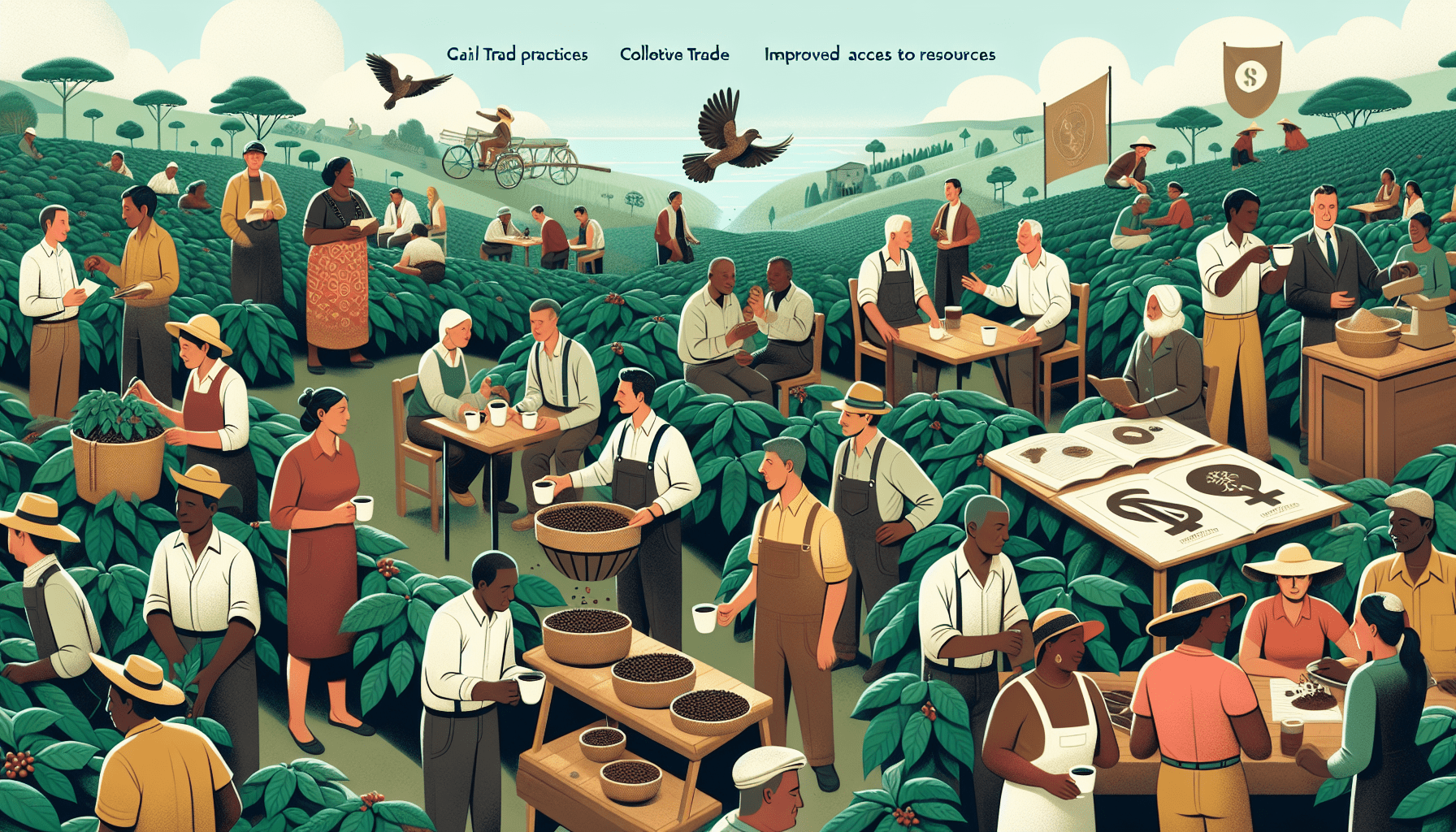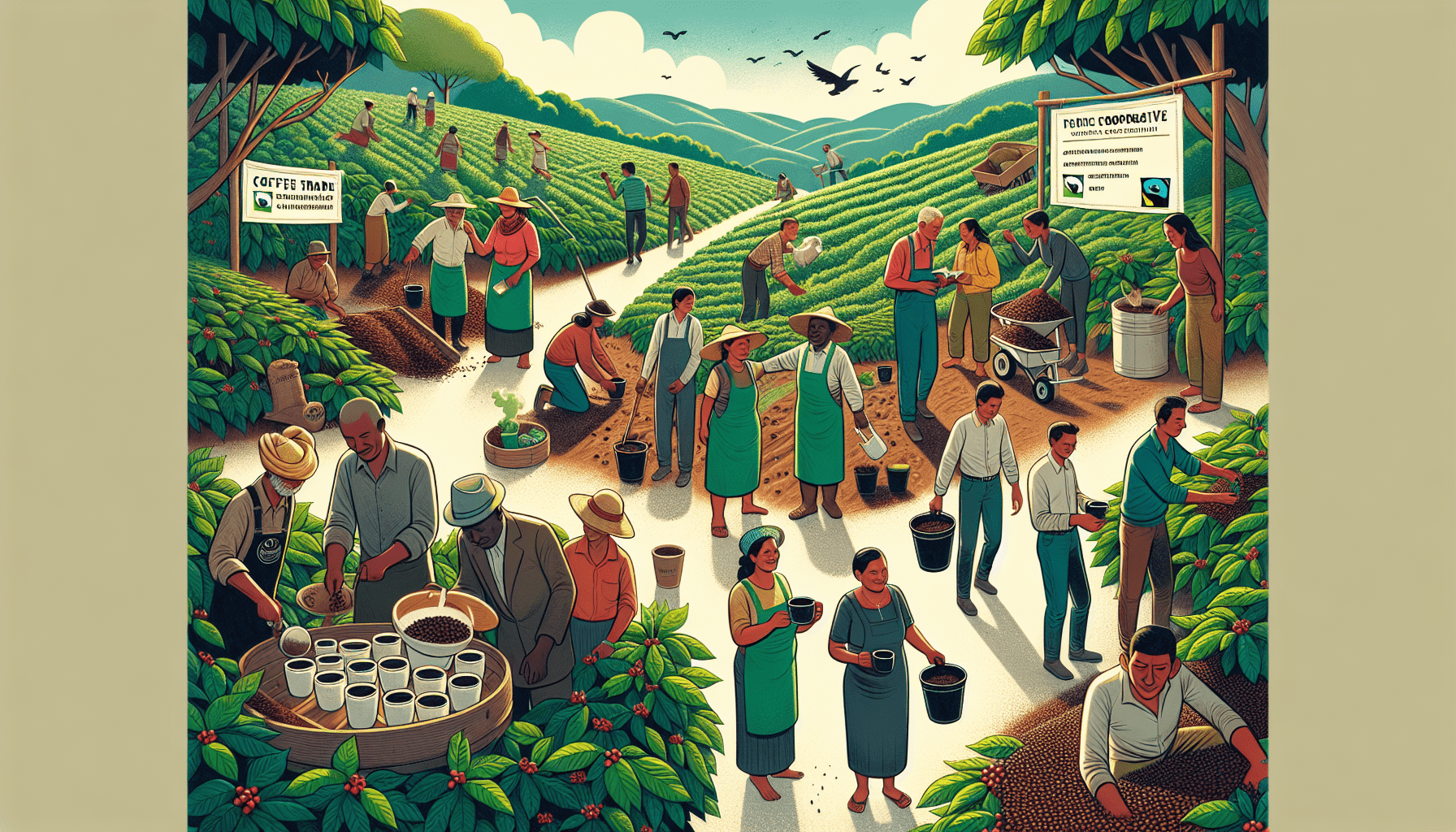Coffee cooperatives provide numerous benefits to farmers in the coffee industry. By joining forces and pooling their resources, farmers can gain access to a wide range of advantages that would be difficult to obtain individually. These cooperatives foster collaboration, enabling farmers to share knowledge, expertise, and best practices. With increased bargaining power, farmers are also able to negotiate better prices for their coffee beans, ensuring a fairer income. Additionally, cooperatives often provide financial services, such as access to credit and loans, which can help farmers invest in their farms and improve their productivity. Overall, coffee cooperatives play a vital role in empowering farmers and promoting sustainability within the coffee industry.

Access to Fair Prices
Coffee cooperatives are instrumental in ensuring that farmers receive fair prices for their products. By bypassing the exploitative middlemen, cooperatives enable farmers to directly sell their coffee to buyers, eliminating the need for intermediaries who often take a substantial portion of the profit. This direct trade arrangement ensures that farmers can command a fair share of the profits from their hard work and dedication. With fair prices, farmers can enjoy greater financial stability and support their families and communities.
Collective Bargaining Power
One of the significant advantages of coffee cooperatives is the increased bargaining power they provide to farmers. By joining together, farmers can negotiate better terms and prices when dealing with buyers. The collective strength of the cooperative enhances their position in the market, allowing them to have a more significant say in trade agreements and contracts. This empowerment enables farmers to secure favorable terms and conditions, ultimately benefiting their livelihoods and the sustainability of their businesses.
Shared Production Costs
Cooperatives allow farmers to pool their resources for purchasing inputs like fertilizers, seeds, and equipment. By purchasing in bulk, they can take advantage of economies of scale and obtain these essential resources at lower costs. This collective approach not only reduces the financial burden on individual farmers but also enables them to access higher quality inputs that might otherwise be unaffordable. Sharing production costs through cooperatives enhances the overall efficiency of coffee farming and promotes a more sustainable and profitable industry.
Access to Credit and Financing
One of the significant challenges faced by farmers is the lack of access to credit and financing. Coffee cooperatives play a vital role in addressing this issue by securing loans on behalf of their members. By acting as a unified entity, cooperatives can negotiate better terms and interest rates, eliminating the need for farmers to rely on high-interest loans from lenders. Access to credit and financing provided by the cooperatives enables farmers to invest in their businesses, improve infrastructure, adopt new technologies, and enhance productivity for long-term growth.

Technical Assistance and Training
Coffee cooperatives go beyond economic benefits and also provide crucial technical assistance and training to their members. Through educational resources and workshops, farmers can acquire new skills and knowledge relating to coffee production, processing, and quality control. Furthermore, cooperatives support the adoption of sustainable farming practices, such as agroforestry and conservation, which minimize environmental impact and promote long-term sustainability. By investing in farmers’ education and training, cooperatives empower them to be more resilient and successful in their coffee farming endeavors.
Market Access and Market Information
Cooperatives play a pivotal role in helping farmers access wider markets for their coffee. Through their collective strength, cooperatives can establish relationships with potential buyers, both locally and internationally. By consolidating their coffee offerings, cooperatives can negotiate larger contracts and secure better market access for their members. Additionally, cooperatives provide farmers with valuable market information, including market trends, demand forecasts, and consumer preferences. This knowledge empowers farmers to make informed decisions about their coffee production and tailor their products to meet market demands.

Risk Mitigation
The coffee industry is susceptible to market fluctuations, which can have severe implications for farmers’ incomes. Coffee cooperatives help mitigate this risk by diversifying revenue streams. By introducing different coffee varieties or exploring alternative market channels, cooperatives enable farmers to reduce their reliance on a single product or market, thus spreading the risk among the members. This diversification helps protect farmers against sudden price drops or supply chain disruptions, providing them with more stability and security in their coffee farming endeavors.
Quality Improvement and Certification
Cooperatives play a crucial role in enhancing the quality of coffee produced by their members. They invest in quality control measures, such as cupping tests and sensory evaluations, to ensure that their coffee meets the highest standards. By encouraging farmers to produce high-quality coffee, cooperatives enable their members to access specialty coffee markets that pay premium prices for exceptional beans. Moreover, cooperatives support farmers in obtaining certifications, such as Fair Trade or Organic, which further differentiate their coffee and open doors to niche markets that value sustainable and ethically produced coffee.

Social and Community Impact
Coffee cooperatives have a profound social and community impact on the lives of farmers. By fostering solidarity and cooperation among farmers, cooperatives create a sense of belonging and shared purpose within the community. They provide a platform for farmers to come together, exchange ideas, and collectively address common challenges. Additionally, cooperatives often invest in community development initiatives, such as schools, healthcare centers, or infrastructure projects, that benefit the entire community. By empowering marginalized farmers, cooperatives uplift the well-being of individuals and strengthen the fabric of rural communities.
Environmental Stewardship
Coffee cooperatives play a significant role in promoting environmentally sustainable farming practices. They encourage farmers to adopt agroforestry systems, where coffee plants are grown in harmony with shade trees, preserving biodiversity and protecting ecosystems. By fostering the use of organic fertilizers and minimizing chemical inputs, cooperatives help farmers reduce their environmental impact and safeguard the long-term health of their land. The emphasis on environmental stewardship within cooperatives not only benefits farmers but also contributes to the preservation of natural resources and a more sustainable coffee industry.
Coffee cooperatives bring numerous benefits to farmers, ranging from fair prices and collective bargaining power to shared production costs and technical assistance. The cooperative model creates a supportive and empowering environment for farmers, helping them navigate the challenges of the coffee industry and improve their livelihoods. By promoting sustainable practices, cooperatives play a vital role in ensuring the long-term sustainability of the coffee sector and protecting the well-being of farming communities.

